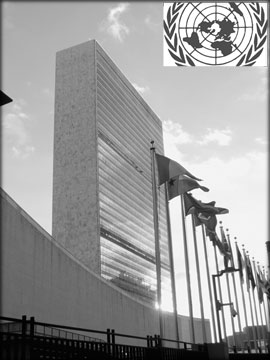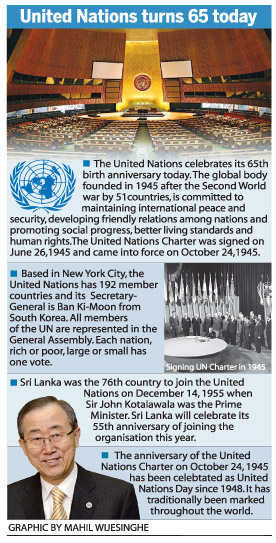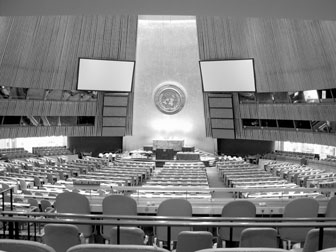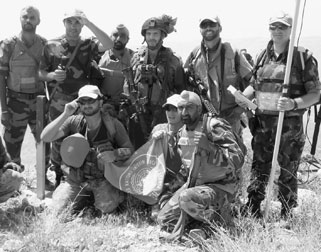The UN at 65: Towards a better future
By Pramod De Silva
 |
|
UN headquaters in New
York |
Our world is mired in conflict, ravaged by poverty and hunger and
threatened by climate change. The nations of the world must work in
unison to face and surmount these myriad challenges. There is, in fact,
a forum where the nations can get together and achieve these noble aims,
if they have the will to do so. It is called the United Nations and
today it turns 65.
It seems ironic that an organisation working for and seeking world
peace could have its roots in the throes of conflict. Yet peace was
exactly what the world wanted at the end of the most brutal war in
history. The name “United Nations”, coined by United States President
Franklin D. Roosevelt, was first used in the “Declaration by United
Nations” of January 1, 1942, during the Second World War, when
representatives of 26 nations pledged to continue fighting together
against the Axis Powers.
The United Nations was thus established in the aftermath of a
devastating war to help stabilise international relations and give peace
a more secure foundation.
However, it took three more years for the UN per se to come into
being. The anniversary of the entry into force of the United Nations
Charter - October 24, 1945 — has been celebrated as United Nations Day
since 1948. Today, there are 192 Member States of the UN - practically
all the countries. Sri Lanka joined the UN in 1955.
The forerunner of the United Nations was the League of Nations, an
organisation conceived in similar circumstances during the First World
War, and established in 1919 under the Treaty of Versailles “to promote
international cooperation and to achieve peace and security.” The
International Labour Organisation was also created under the Treaty of
Versailles as an affiliated agency of the League. However, the League of
Nations ceased its activities after failing to prevent the Second World
War.
UN Charter
 In 1945, representatives of 50 countries met in San Francisco at the
United Nations Conference on International Organization to draw up the
United Nations Charter. Those delegates deliberated on the basis of
proposals worked out by the representatives of China, the Soviet Union,
the United Kingdom and the United States at Dumbarton Oaks, United
States in August-October 1944. The UN Charter was signed on June 26,
1945 by the representatives of the 50 countries. Poland, which was not
represented at the Conference, signed it later and became one of the
original 51 Member States. In 1945, representatives of 50 countries met in San Francisco at the
United Nations Conference on International Organization to draw up the
United Nations Charter. Those delegates deliberated on the basis of
proposals worked out by the representatives of China, the Soviet Union,
the United Kingdom and the United States at Dumbarton Oaks, United
States in August-October 1944. The UN Charter was signed on June 26,
1945 by the representatives of the 50 countries. Poland, which was not
represented at the Conference, signed it later and became one of the
original 51 Member States.
The United Nations officially came into existence a few months later
- on October 24, 1945, when the Charter was ratified by China, France,
the Soviet Union (now Russia), the United Kingdom, the United States
(the five veto-wielding Members of the UN Security Council) and by a
majority of other signatories. Thus the United Nations Day is celebrated
on October 24 each year.
The UN has its Headquarters in New York, USA. The building and the
land are considered sovereign territory of the UN States. The UN
Headquarters hosts the General Assembly sessions every year in
September-October.
Heads of State and Government and/or foreign ministers represent
their respective countries and deliver speeches at the sessions. Special
sessions focusing on particular subjects are sometimes held, such as the
Millennium Goals Summit held this year. The UN is headed by a Secretary
General, currently Ban ki-Moon from South Korea.
The UN has a multitude of specialised agencies, focusing on
everything from human rights, child survival and development,
environment, health and medical research, alleviation of poverty,
economic development, agricultural development, education, population,
labour, disaster relief and air and sea travel. The most important of
the 15 agencies are the World Health Organisation, the International
Labour Organisation, Food and Agricultural Organisation, the World Food
Programme, United Nations Development Programme, United Nations
Environment Programme, UNESCO and UNICEF. It is easy to criticise the UN
as a ‘talking shop’ but that is an insult to the good work done by these
organisations especially in the developing world. Did you know that 90
million people in 73 countries have been fed by the World Food Program
so far in 2010 or that 7.5 million children were vaccinated against
polio in 2009 by UNICEF and the World Health Organization ? These are
just two examples of the work done by the UN.
Peace keeping mission
But possibly the most well-known aspect of the UN is its peace
keeping mission - also known as the Blue Helmets. Sri Lankan Forces
personnel are also involved in UN Peace keeping operations in Haiti,
just one of 16 such missions around the world. The activities of
blue-helmeted peace-keepers have emerged as the most visible role
associated with the world organization.
 |
 |
|
UN specialised agencies on varying
missions (Top) UN Assembly Hall |
World peace will be a boon to the developing world. Most of the
countries affected by conflict are in the Third World and we in Sri
Lanka have seen how the end of a protracted conflict can stimulate an
economy and raise people’s hopes for a better future.
The UN’s biggest challenge remains the Millennium Development Goals -
eight aims which have to be fulfilled by end 2015, just five years away.
World leaders have again committed themselves to achieve these goals,
but many regions of the world might need more time. Sri Lanka is well on
its way vis-à-vis the MDGs, but that is not true of many other
countries. Indeed, the picture is bleak. Nearly 1.6 billion people, or
one quarter of the population of the developing world, live below the
international poverty line, on less than $1.25 a day. One billion people
globally lack access to adequate food, 2.6 billion lack access to
improved sanitation, almost nine million children die before the age of
five and at least 340,000 women die every year from pregnancy-related
causes. More than 884 million people worldwide still use unimproved
water sources.
Among the MDGs are eradicating extreme poverty and hunger; achieving
universal primary education; promoting gender equality and empowering
women; reducing child mortality; improving maternal health; combating
HIV/AIDS and other diseases; ensuring environmental sustainability; and
developing global partnerships to meet the goals. The UN must propel the
developed world to increase Official Development Assistance to the
developing world to accelerate the MDGs. Just a fraction of the
multi-billion dollar stimulus package for economic revival of the
developed world or a reduction of their defence expenditure would be
adequate.
This brings us to the issue of disarmament. If the rich countries can
cut down on their weapons and defence programs and divert such monies
for the Third World, both world peace and MDGs will be one step closer.
It is estimated that each nuclear weapon-equipped country spends close
to US$ 100 million per day to maintain their arsenal. These funds could
have been used for development.
Disarmament Week
It is therefore appropriate that the World Disarmament Week begins on
October 24, UN Day. The annual observance of Disarmament Week, was
called for in the Final Document of the General Assembly 1978 special
session on disarmament. Member States were invited to highlight the
danger of the arms race, propagate the need for its cessation and
increase public understanding of the urgent tasks of disarmament.
The UN has a separate agency for disarmament - the UN Office for
Disarmament Affairs. The Conference on Disarmament (CD), not connected
to the UN, is the world’s sole multilateral disarmament treaty
negotiating body. It works closely with the UN to achieve disarmament.
From nuclear weapons to small arms, the world is overflowing with
weapons designed for death and destruction. The last nuclear explosion
was in 1945 in Japan, but many more countries have joined the nuclear
club despite the existence of a Nuclear Non Proliferation Treaty. The
profileration of small arms among non-state actors is another worrying
factor. Several treaties have been signed to limit the manufacture of
weapons, but countries are stockpiling more weapons of all varieties.
This threatens the peace and stability of individual nations and the
world in general. There is also the possibility of terrorist groups
using weapons of mass destruction including nuclear and chemical agents.
The world should move rapidly with regard to arms treaties which seek
to limit the deployment of nuclear and other weapons. Conflict
resolution and the eradication of terrorism should also be part of this
solution. If the ongoing conflicts around the world are resolved, there
will much less demand for weapons. The elimination of terror groups
would also lead to peace in terror-infested regions.
Peace is the ideal solution for the woes of the world. The UN has a
pivotal role to play in this exercise, from conflict resolution to
disarmament. However, the UN should become more dynamic and more global
in its outlook to achieve these aims. Many world leaders have called for
radical UN reforms to make it more effective. More countries should be
given a voice in its deliberations and decisions. The imbalance between
the powers given to rich and poor countries must be addressed. The UN
must be geared to meet all future challenges, not just the MDGs. A more
effective UN will certainly make the world a better place to live in.
|

